Nic nie wywołuje takiego paniki jak komunikat o błędzie „403 Forbidden” w miejscu, gdzie powinna znajdować się Twoja strona internetowa. Jest to frustrująca cyfrowa blokada, która uniemożliwia Ci dostęp do obszaru administracyjnego i ukrywa Twoje treści przed odwiedzającymi.
W WPBeginner sami napotkaliśmy ten błąd na naszych stronach i pomogliśmy tysiącom użytkowników go naprawić. Wiemy, jak stresujące to może być, ale zapewniamy, że rozwiązanie jest często proste.
Ten przewodnik przeprowadzi Cię przez najczęstsze przyczyny i dostarczy jasnych instrukcji, aby szybko przywrócić Twoją stronę do działania.
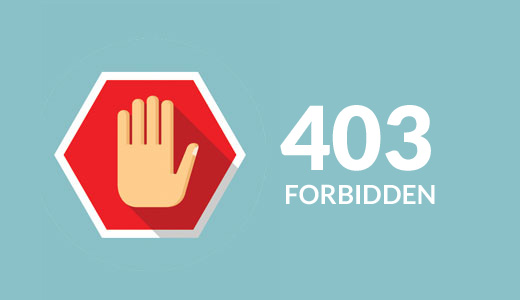
Szybkie podsumowanie: Błąd 403 Forbidden w WordPress jest najczęściej spowodowany przez źle skonfigurowaną wtyczkę, uszkodzony plik .htaccess lub nieprawidłowe uprawnienia do plików serwera. Ten przewodnik zawiera proste, krok po kroku rozwiązania pozwalające zidentyfikować i naprawić problem.
Czym jest błąd 403 Forbidden w WordPress?
Kod błędu 403 Forbidden jest wyświetlany, gdy uprawnienia serwera nie pozwalają na dostęp do określonej strony na Twojej stronie WordPress.
Ten błąd jest zazwyczaj towarzyszy tekst:
403 Forbidden – Nie masz uprawnień do dostępu do „/” na tym serwerze.
Dodatkowo napotkano błąd 403 Forbidden podczas próby użycia ErrorDocument do obsługi żądania.
Oto przykład, jak to wygląda:
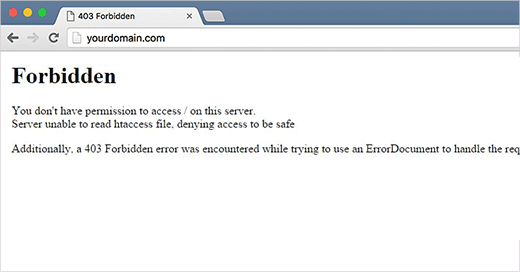
Istnieją różne scenariusze, w których możesz zobaczyć ten błąd. Na przykład:
- 403 Forbidden – odmowa dostępu do wp-admin lub strony logowania WordPress.
- 403 Forbidden – podczas instalacji WordPress.
- Błąd 403 Forbidden – podczas odwiedzania dowolnej strony w witrynie WordPress.
Możesz również zobaczyć „Odmowa dostępu” zamiast pełnego statusu 403 Forbidden. Alternatywnie komunikat może brzmieć: „Dostęp do twojadomena.com został odmówiony. Nie masz uprawnień do przeglądania tej strony”.
Więcej wyjaśnień na temat kodów błędów WordPressa znajdziesz w naszym zestawieniu najczęstszych błędów WordPressa i sposobów ich naprawy.
Co powoduje błąd 403 Forbidden w WordPress?
Błąd 403 Forbidden pojawia się, gdy serwer WWW nie uważa, że masz uprawnienia do wyświetlenia określonej strony.
Najczęstsze przyczyny to:
- Źle skonfigurowane wtyczki bezpieczeństwa: Wiele wtyczek bezpieczeństwa WordPress blokuje adresy IP, jeśli uzna je za złośliwe, co czasami może prowadzić do przypadkowych blokad.
- Uszkodzony plik .htaccess: Ten krytyczny plik WordPress może ulec uszkodzeniu, co prowadzi do nieprawidłowych reguł dostępu.
- Nieprawidłowe uprawnienia do plików: Każdy plik i folder na Twoim serwerze ma przypisane uprawnienia. Jeśli są one ustawione nieprawidłowo, serwer zablokuje dostęp.
- Problemy z konfiguracją serwera: Twoja firma hostingowa WordPress może czasami wprowadzać przypadkowe zmiany w ustawieniach serwera, które skutkują błędem 403.
Teraz przyjrzyjmy się, jak naprawić błąd 403 Forbidden w WordPress.
Uwaga: Zanim wprowadzisz jakiekolwiek zmiany, zalecamy wykonanie pełnej kopii zapasowej swojej witryny. Nasz zespół używa do tego Duplicator, ale możesz skorzystać z naszego przewodnika jak wykonać kopię zapasową witryny WordPress, aby poznać inne opcje.
Możesz skorzystać z tych szybkich linków, jeśli chcesz przejść do konkretnej metody:
- Metoda 1: Tymczasowo dezaktywuj swoje wtyczki
- Metoda 2: Ponownie wygeneruj swój plik .htaccess
- Metoda 3: Popraw uprawnienia plików i katalogów
- Metoda 4: Wyczyść pamięć podręczną i pliki cookie
- Metoda 5: Tymczasowe wyłączenie CDN (Content Delivery Network)
- Metoda 6: Sprawdź pod kątem złośliwego oprogramowania
- Metoda 7: Skontaktuj się ze swoim dostawcą hostingu lub ekspertem WordPress
- Samouczek wideo
- Często zadawane pytania dotyczące błędów WordPress
Metoda 1: Tymczasowo dezaktywuj swoje wtyczki
Pierwszym krokiem jest sprawdzenie, czy jeden z Twoich wtyczek nie powoduje błędu.
Aby to zrobić, musisz tymczasowo wyłączyć wszystkie wtyczki WordPress, w tym wszelkie wtyczki bezpieczeństwa.
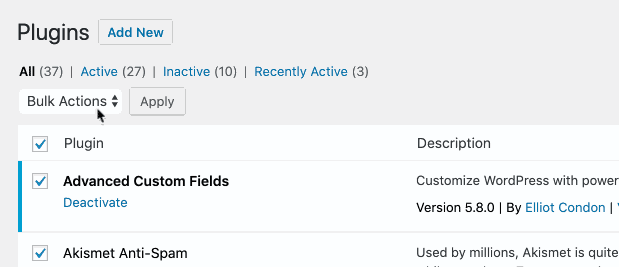
Jeśli to rozwiąże problem, oznacza to, że jedna z wtyczek w Twojej witrynie powodowała błąd.
Możesz dowiedzieć się, która wtyczka była winowajcą, aktywując je pojedynczo, aż ponownie pojawi się błąd 403. Po znalezieniu problematycznej wtyczki powinieneś ją usunąć i poszukać alternatywy lub skontaktować się z jej twórcami w celu uzyskania pomocy.
Metoda 2: Ponownie wygeneruj swój plik .htaccess
Często błąd 403 Forbidden jest spowodowany uszkodzonym plikiem .htaccess na Twojej stronie WordPress. Dobra wiadomość jest taka, że naprawa tego pliku jest dość łatwa.
Najpierw musisz połączyć się ze swoją stroną internetową za pomocą klienta FTP, takiego jak FileZilla, lub aplikacji Menedżer plików w panelu hostingowym.
Następnie znajdź plik .htaccess w głównym folderze Twojej strony WordPress. Jeśli go nie widzisz, być może będziesz musiał włączyć ukryte pliki w swoim kliencie FTP.
Zapoznaj się z tym przewodnikiem, jeśli nie możesz znaleźć pliku .htaccess w folderze WordPress.
Pobierz plik .htaccess na swój komputer, aby mieć świeżą kopię zapasową. Następnie usuń plik z serwera.
Nie martw się, Twoja strona WordPress będzie tymczasowo działać bez niego.
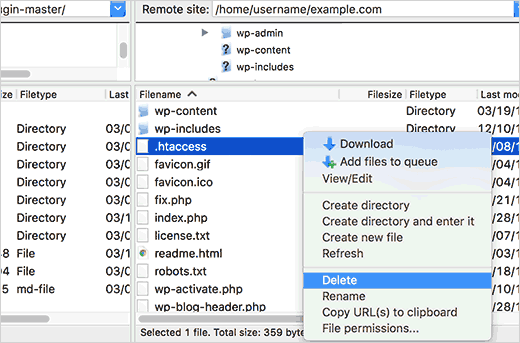
Teraz spróbuj uzyskać dostęp do swojej strony internetowej. Jeśli błąd 403 Forbidden zostanie rozwiązany, oznacza to, że Twój plik .htaccess był uszkodzony.
Możesz wygenerować nowy plik .htaccess, logując się do panelu administracyjnego WordPress i przechodząc do strony Ustawienia » Bezpośrednie odnośniki.
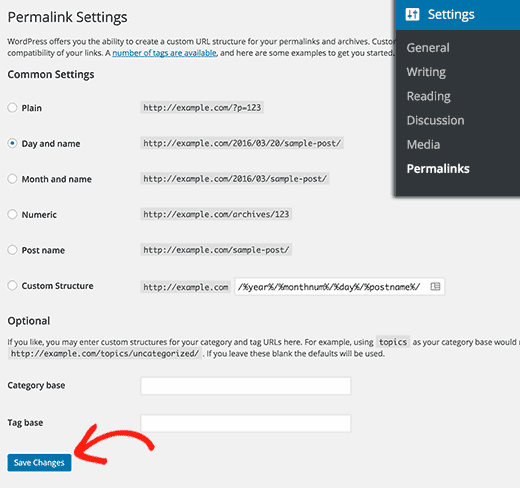
Po prostu kliknij przycisk „Zapisz zmiany” u dołu strony. WordPress wygeneruje dla Ciebie nowy, poprawny plik .htaccess.
Metoda 3: Popraw uprawnienia plików i katalogów
Jeśli inne rozwiązania nie naprawiły błędu, to nieprawidłowe uprawnienia do plików są najbardziej prawdopodobną przyczyną. Wszystkie pliki na Twojej stronie internetowej mają uprawnienia, które kontrolują, kto może je odczytywać, zapisywać i wykonywać.
Nieprawidłowe uprawnienia mogą powodować błąd 403 Forbidden. Sprawiają, że serwer WWW myśli, że nie masz uprawnień do dostępu do tych plików.
Możesz poprosić swojego dostawcę hostingu WordPress o sprawdzenie poprawności uprawnień do plików na Twojej stronie internetowej. Wielu dostawców hostingu jest bardzo pomocnych i naprawi to za Ciebie.
Nieprawidłowa zmiana uprawnień do plików może mieć poważne konsekwencje. Jeśli nie czujesz się pewnie, najlepiej poproś swojego dostawcę hostingu lub zatrudnij profesjonalistę.
Jeśli jednak chcesz zrobić to sam, oto jak możesz sprawdzić swoje uprawnienia do plików. Połącz się ze swoją witryną WordPress za pomocą klienta FTP i przejdź do folderu głównego zawierającego wszystkie Twoje pliki WordPress.
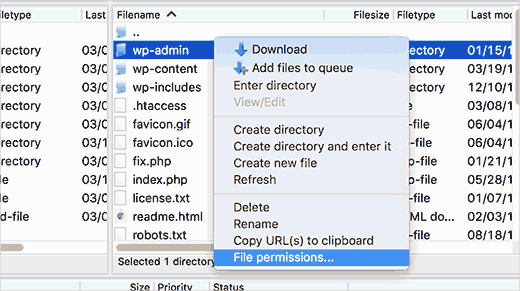
Kliknij prawym przyciskiem myszy na folder i wybierz z menu „Uprawnienia do plików”.
Twój klient FTP wyświetli okno dialogowe uprawnień.
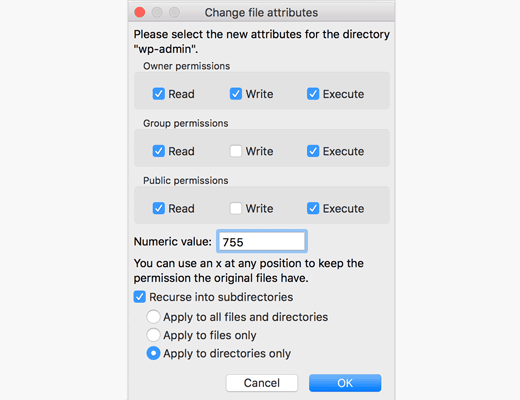
Wszystkie foldery na Twojej stronie WordPress powinny mieć uprawnienia do plików wynoszące 744 lub 755. Wszystkie pliki powinny mieć uprawnienia do plików wynoszące 644 lub 640.
Możesz ustawić uprawnienia dla folderu głównego na 755. Zaznacz pole wyboru „Przejdź do podkatalogów” i wybierz opcję „Zastosuj tylko do katalogów”. Kliknij „OK”, aby zastosować.
Następnie powtórz proces dla wszystkich plików. Tym razem użyj uprawnień do plików wynoszących 644. Zaznacz pole wyboru „Przejdź do podkatalogów” i wybierz opcję „Zastosuj tylko do plików”.
Teraz musisz kliknąć „OK”. Gdy to się zakończy, spróbuj uzyskać dostęp do swojej witryny, aby sprawdzić, czy błąd 403 Forbidden zniknął.
Metoda 4: Wyczyść pamięć podręczną i pliki cookie
Czasami najprostsze rozwiązanie jest najskuteczniejsze. Wyczyść pamięć podręczną i pliki cookie przeglądarki, aby rozwiązać problem błędu 403 Forbidden. Uszkodzone dane przechowywane przez przeglądarkę mogą powodować problemy z kompatybilnością.
Podobnie, uszkodzona pamięć podręczna wygenerowana przez wtyczkę WordPress może również powodować problemy. Używamy WP Rocket na naszych stronach, a czyszczenie jej pamięci podręcznej jest standardowym krokiem rozwiązywania problemów. Jeśli Twoja wtyczka buforująca ma ustawienia ograniczające dostęp, przyczyną mogą być również błędy konfiguracji.
Aby wyczyścić pamięć podręczną przeglądarki, postępuj zgodnie z instrukcjami w naszym przewodniku jak wyczyścić pamięć podręczną w głównych przeglądarkach.
Jeśli używasz wtyczki, po prostu zapoznaj się z naszym przewodnikiem jak wyczyścić pamięć podręczną WordPress.
Metoda 5: Tymczasowe wyłączenie CDN (Content Delivery Network)
Jeśli używasz sieci dostarczania treści (CDN), aby poprawić szybkość witryny, może ona zakłócać działanie i powodować błąd. CDN działa jako pośrednik między Twoim serwerem a odwiedzającymi.
Aby sprawdzić, czy CDN jest winowajcą, tymczasowo wyłącz go w jego ustawieniach. Następnie przetestuj swoją witrynę, aby sprawdzić, czy błąd znika.
Jeśli wyłączenie CDN rozwiązuje problem, będziesz musiał skontaktować się z zespołem pomocy technicznej swojego dostawcy CDN w celu uzyskania dalszej pomocy.
Metoda 6: Sprawdź pod kątem złośliwego oprogramowania
Złośliwe oprogramowanie może powodować różnorodne problemy, w tym błąd 403 Forbidden. Może ono zakłócać uprawnienia do plików lub przerywać komunikację między Twoją witryną a serwerem.
Aby sprawdzić obecność złośliwego oprogramowania, zalecamy przeskanowanie Twojej witryny.
W przypadku naszych własnych witryn polegamy na potężnym skanerze dołączonym do Sucuri. Wiele innych wtyczek zabezpieczających oferuje również funkcje skanowania pod kątem złośliwego oprogramowania i często potrafi usunąć złośliwe pliki jednym kliknięciem.
Metoda 7: Skontaktuj się ze swoim dostawcą hostingu lub ekspertem WordPress
Jeśli wypróbowałeś wszystkie poprzednie kroki, a błąd nadal występuje, problem może leżeć po stronie serwera. Skontaktowanie się z zespołem pomocy technicznej Twojego dostawcy hostingu to świetny kolejny krok, ponieważ mogą oni sprawdzić logi serwera i uprawnienia do plików.
Szczegółowe informacje znajdziesz w naszym przewodniku na temat jak skontaktować się z pomocą techniczną WordPress.
Samouczek wideo
Jeśli wolisz bardziej wizualne instrukcje, obejrzyj poniższy film.
Często zadawane pytania dotyczące błędów WordPress
Oto odpowiedzi na niektóre często zadawane pytania dotyczące błędów WordPress.
Jaka jest różnica między błędem 403 a błędem 404?
Błąd 403 Forbidden oznacza, że serwer rozumie żądanie, ale odmawia udzielenia dostępu z powodu problemu z uprawnieniami. Natomiast błąd 404 Not Found oznacza, że serwer w ogóle nie może znaleźć żądanej strony.
Jak znaleźć logi błędów WordPress, aby uzyskać więcej wskazówek?
Logi błędów mogą dostarczyć szczegółowych informacji technicznych. Często można je znaleźć w panelu sterowania hostingu lub włączając tryb debugowania WordPress. Nasz przewodnik wyjaśnia jak znaleźć i uzyskać dostęp do logów błędów WordPress.
Czy błąd 403 jest podobny do błędu wewnętrznego serwera 500?
Nie, są one różne. Błąd 403 to problem z uprawnieniami. Błąd wewnętrznego serwera 500 to bardziej ogólny komunikat wskazujący, że coś poszło nie tak na serwerze, ale nie precyzuje co.
Mamy nadzieję, że ten artykuł pomógł Ci naprawić błąd 403 Forbidden w WordPress. Możesz również zapoznać się z naszym zestawieniem najczęstszych problemów z edytorem bloków oraz naszym wyborem najlepszych niezbędnych wtyczek WordPress, aby rozwijać swoją witrynę.
Jeśli podobał Ci się ten artykuł, zasubskrybuj nasz kanał YouTube po samouczki wideo WordPress. Możesz nas również znaleźć na Twitterze i Facebooku.





Gary Parker
Żadne z tych rozwiązań nie naprawia mojego problemu, ponieważ dotyczy jednej strony i jedynym sposobem, w jaki mogłem to naprawić, było zmianę nazwy permalinka. Strona z problemem to https://example.com/blog/ i jedynym sposobem, w jaki mogłem to naprawić, było zmienienie jej na /blog2/, jakieś pomysły?
Michael
Proszę, niech ktoś mi pomoże. Mam dwie strony na tym samym hostingu. Właśnie dodałem trzecią domenę dodatkową i zainstalowałem na niej WordPressa za pomocą instalatora softaculous.
Problem nie leży po stronie WordPress, a inne strony na tym samym hostingu są dostępne.
Proszę o pomoc.
Andreas Johansson
I hade one page Forbiden 403 and tryied all the steps. And now i dont have permission to login wp-admin on my site?
Wsparcie WPBeginner
Cześć Andreas,
Zapoznaj się z naszym przewodnikiem po rozwiązywaniu problemów z WordPress. Pomoże Ci to zidentyfikować problem, a następnie go naprawić.
Admin
Marcus
Działało jak magia
Juliet Julius
Dziękuję bardzo za ten artykuł. Mój problem polegał na uszkodzonym pliku htaccess. Moja strona działa teraz poprawnie.
Aleli Sanchez Mendez
Nadal mam ten problem. Próbowałem wszystkich kroków. Problem zaczął się, gdy zainstalowałem wtyczkę WooCommerce na mojej stronie WordPress. Teraz na moim wordpressie otrzymuję błąd 403 Forbidden, a na mojej drugiej stronie, bez wordpressa, otrzymałem błąd 502 Bad Gateway.
Czy ktoś może mi pomóc?
Scott Munson
Odkryłem – po tym, jak wszystko inne zawiodło i spędziłem wiele godzin, że kiedyś (ale już nie) używałem Bullet Proof security. Pozostawiło to zbędny plik .htaccess w moim folderze wp-admin – TO właśnie powodowało błąd 403. ARGH!
Wsparcie WPBeginner
Hej Scott,
Thanks for sharing, glad you found the solution
Admin
joshua jenish zibhu
jak rozwiązać ten problem…. w systemie Windows 10……
Jan
Dziękuję, zadziałało u mnie.
Oluwaseun
Dzięki!
Zmiana uprawnień do pliku działa u mnie.
Yogesh
Wielkie dzięki. Usunięcie .htaccess zadziałało u mnie.
JU
There has to be a fourth step. None of these steps applied. The plugins weren’t the cause. The .htaccess file wasn’t the cause. All the permissions in all files and folders are set to the correct numerical values.
Sendhil Kumar S K
Cześć Przyjaciele, Jeden prosty krok uwolni Cię od istniejącego problemu.
1. Przejdź do CPanelu swojej domeny
2. Kliknij, aby rozwinąć folder public_html znajdujący się po lewej stronie ekranu.
3. Kliknij dwukrotnie folder wp znajdujący się po prawej stronie ekranu
4. Skopiuj wszystkie pliki i foldery wewnątrz folderu wp
5. Przenieś wszystkie pliki i foldery wewnątrz folderu wp na WYŻSZY POZIOM
6. Teraz wszystkie pliki i foldery są poza folderem WP, więc folder WP jest pusty, wejdź poziom wyżej i usuń pusty folder WP
7. Teraz przejdź do przeglądarki i wpisz swoją domenę.com, DOSKONALE będzie DZIAŁAĆ
Wszystkiego najlepszego… jeśli masz wątpliwości co do tej wiadomości, napisz do mnie na
Również jeśli czas pozwoli, odwiedź moją stronę
Dziękuję wszystkim
Sergio Casabona
Cześć! Dzięki za ten artykuł!
Dostałem ten błąd, więc połączyłem się przez FTP i usunąłem plik .htaccess. Teraz mogę uzyskać dostęp do mojego panelu. Ale kiedy przechodzę do ustawień i ponownie zapisuję, tak jak mówisz, błąd 403 powraca. Co mogę zrobić?
Dzięki, chłopaki!
Josh Allen
A co jeśli mam serwer dedykowany i dzieje się to na wszystkich moich 43 stronach... Właśnie zrobiłem jakiś rodzaj aktualizacji WHM na Bluehost, potem to się stało... Czekam godzinę, żeby porozmawiać z Bluehost.
Ronald
Josh –
Mnie spotkało coś podobnego. „Nagle” żadna z moich stron już nie działała.
Hostuję strony na moim własnym MacMini, z systemem OS-X Server. Po nocy spędzonej na rozwiązywaniu problemów, ostatecznie odkryłem, że pierwotną przyczyną było włączenie serwera FTP w OS-X Server. Tam ustawiłem uprawnienia do folderu głównego strony dla „Everyone Else” na „None” (wydawało się trochę trudne, aby wszyscy mieli dostęp do odczytu moich stron!). Wygląda na to, że blokuje to również dostęp użytkownika _www do stron internetowych…
Po zmianie tego z powrotem na „Read Only”, moje strony zaczęły działać ponownie… Pffff.
Szukam teraz trwałego rozwiązania, które nie jest: „Zamknij mój firewall dla ruchu FTP”.
Mam nadzieję, że to pomoże,
Ronald
Krishna Patel
This post saved my life! I can’t thank you enough for this helpful information but.. thanks a million
shah faisal
Nie masz uprawnień do dostępu do /loading.php na tym serwerze.
Dodatkowo, podczas próby użycia ErrorDocument do obsługi żądania napotkano błąd 403 Forbidden.
James
Opcja uprawnień do plików rozwiązała problem, dziękuję bardzo.
gab
Otrzymuję błąd 403 dla mojej strony i nie mogę nawet zalogować się do WordPressa z tego powodu… Nie wiem, jak to naprawić i nie widzę nikogo z podobnym problemem.
Reshan
Cześć. Moje WordPress jest zarządzane przez firmę hostingową. Więc nie mam dostępu roota. Jak mogę rozwiązać ten problem?
Wsparcie WPBeginner
Cześć Reshan,
Skontaktuj się ze swoją firmą hostingową. Będą w stanie to dla Ciebie naprawić.
Admin
Prince
Dziękuję. Pomogliście mi rozwiązać mój problem.
Rafael Hernandez-Padilla
Dziękuję, artykuł rozwiązał problem, który miałem na mojej stronie.
Yves
Ten sam problem tutaj, i przez FTP ten sam rezultat… sprawdziłem w Cpanelu i zauważyłem, że uprawnienia mojego głównego katalogu wynosiły 0000, zmieniłem na 0755 i zostało naprawione
Mimi
W moim przypadku miałem swoją stronę internetową przez 4 lata i nagle dzisiaj pojawił się ten błąd, chociaż nie dotykałem plików ani nie zmieniałem żadnych uprawnień. Zalogowałem się do panelu sterowania i zauważyłem, że z jakiegoś powodu plik index.php zniknął z głównego folderu Wordpress. Pobrałem nową kopię Wordpressa i skopiowałem plik index.php do głównego folderu mojej strony Wordpress, a strona wróciła do działania!
Więc może jeśli ktoś napotka ten sam błąd, proszę dwukrotnie sprawdzić, czy macie plik index.php lub index.html. Mam nadzieję, że to pomoże.
Cian
Ratunek – dziękuję! To również zadziałało u mnie.
justin
Zgadzam się... nie mam pojęcia dlaczego/jak, ale plik index.php zniknął, gdy pracowałem nad projektem... uratowała mnie masa kłopotów automatyczna kopia zapasowa, w której index wciąż istniał.
Nick
Dzięki Mimi! To zadziałało u mnie, podczas gdy rozwiązania z artykułu nie. W moim przypadku plik index.php faktycznie nie zniknął, ale kiedy zastąpiłem ten, który tam był, świeżym, strona zaczęła działać ponownie, więc zgaduję, że był uszkodzony lub miał jakiś inny problem.
Mój konkretny komunikat o błędzie również wspominał o pliku index.php, więc to też ma sens:
Niedozwolone
Nie masz uprawnień do dostępu do /index.php na tym serwerze.
Dodatkowo napotkano błąd 403 Forbidden podczas próby użycia ErrorDocument do obsługi żądania.
AMar pal
Pomóż mi, moja strona internetowa nie działa. Próbowałem wszystkich podanych rozwiązań, ale nic nie zadziałało...
Edgar
Nic mi nie działało, dopóki nie dodałem „Options +FollowSymLinks” (bez cudzysłowów) nad „RewriteEngine On”.
Doni
Zrobiłem wszystkie trzy możliwe przyczyny błędu 403, które poinformowałeś, ale nadal występował błąd. Przy okazji chciałem edytować szablon stopki, ale kiedy zapisałem/zaktualizowałem plik, pojawił się komunikat „403 Forbidden Dostęp do tego zasobu na serwerze jest zabroniony!”
Mimi
To odpowiedź na Twój komentarz na wpbegginer.com (komentarz zacytowano poniżej)
Nie jestem pewien, czy udało Ci się rozwiązać problem, ale chciałbym Cię poinformować, że dzisiaj otrzymałem ten sam błąd i okazało się, że problemem jest brak pliku index.php w głównym folderze mojej strony internetowej.
———————————————————————–
„Zrobiłem wszystkie trzy możliwe poprawki powodujące błąd 403, o których mnie poinformowałeś, ale nadal występował ten błąd. Swoją drogą, chciałem edytować szablon stopki, ale kiedy zapisałem/zaktualizowałem plik, pojawił się komunikat „403 Forbidden Access to this resource on the server is denied!””
Alexandra
Witam,
Potrzebuję pomocy, podczas próby instalacji WordPressa z MAMP, po zrobieniu wszystkiego, co miałem zrobić, pojawił się ten błąd:
„Forbidden”
Nie masz uprawnień do dostępu do /mysite na tym serwerze.
Dodatkowo, podczas próby użycia ErrorDocument do obsługi żądania napotkano błąd 403 Forbidden.
Pomocy!
Vasil
Cześć wszystkim.
Zabronione
Nie masz uprawnień do dostępu do /shop/ na tym serwerze.
Próbowałem wszystkiego i nic nie działa.
Jeśli ktoś może pomóc, byłoby wspaniale, dziękuję.
KimD
Dzięki. Świetny artykuł. Aby rozwiązać mój problem, musiałem zastosować niewielką wariację tego, co zostało napisane. Kiedy spojrzałem, znalazłem dwa pliki htaccess, jeden w katalogu głównym i drugi w katalogu wp-admin. Odzyskałem dostęp do mojej strony, zmieniając nazwę pliku htaccess w katalogu wp-admin.
Alex
Cieszę się, że to opublikowałeś, to był dokładnie mój problem! Dzięki!
Kingsley Felix
Witam;
U mnie pojawia się, gdy chcę zapisać zmiany w artykule przez usuniętego użytkownika administratora
Steve
Mam użytkownika, który otrzymuje następujący błąd 403, gdy próbuje zostawić komentarz:
Błąd 403 Forbidden
Jeśli dotarłeś tutaj w wyniku wyszukiwania lub kliknięcia w link, naciśnij przycisk Wstecz w swojej przeglądarce, aby powrócić do poprzedniej strony. Dziękujemy.
Adres IP: xxx.xx.xx.xx” (tutaj pojawia się jego rzeczywisty adres IP)
Co może być nie tak?
David
mój problem jest w pliku .htaccess. fragment ratuje moją stronę. Dziękuję bardzo
Wsparcie WPBeginner
You are welcome
Admin
Omotayo Adeoye
Cześć,
Otrzymuję komunikat „Forbidden” na stronie wp-admin mojej witryny. Nie pojawia się błąd 403 – forbidden; po prostu wyświetla się „forbidden”.
Zainstalowałem ponownie WordPressa, sprawdziłem uprawnienia do plików, sprawdziłem plik .htaccess, zdezaktywowałem wszystkie wtyczki itp., a mimo to nie działa.
Proszę, co mogę zrobić!
Wielkie dzięki.
Ricardo
Cześć! Kiedy udostępniam link do mojej strony na Facebooku, tytuł to 403 Forbidden. Bezpośrednio na mojej stronie nie widzę żadnego komunikatu 403 Forbidden. Próbowałem wielu porad, które znalazłem, takich jak usunięcie pliku .htaccess, dezaktywacja wszystkich wtyczek, a także sprawdzenie uprawnień. Próbowałem debugować za pomocą debuggera Facebooka, ale informacje się nie zmieniają. Czy ktoś może mi pomóc rozwiązać ten problem?
Mukesh Sharma
Cześć Ricardo,
wyślij mi link do swojej strony. Mogę pomóc.
Harney Cercado
Niesamowite! Uratowałeś mi życie!
Dzięki!
Shane
To było bardzo pomocne, dziękuję wam bardzo, jak mówimy na Jamajce „Szacunek”
Javier Gomez
Mam wiele błędów 403 z moimi obrazami, skorzystam z Twojej rady, dziękuję za informację
Przepraszam za mój słaby angielski
Christopher Sowerby
Cześć. mój problem polega na tym, że mogę się wylogować z panelu administracyjnego, ale nie mogę się wylogować z frontendu (używając paska na górze).
Wydaje się, że nonce w adresie URL wylogowania jest inny po stronie backendu. Czy wiesz, dlaczego tak się dzieje? Usunąłem wszystko z mojego pliku functions.php, ale nadal się to dzieje.
Rameez Ramzan
Cześć,
Jestem nowicjuszem w WordPress i obecnie mam pewien problem podczas logowania do panelu administracyjnego WordPress.
Podczas logowania pojawia się błąd 403 Forbidden, ale z drugiej strony mój przyjaciel otwiera podobną stronę w swoim internecie, a tam działa poprawnie. Uprzejmie proszę o informację.
Dzięki,
Pascal
Thank you for this great post! I resolved my 403 error!!!
Wsparcie WPBeginner
Hey Pascal, glad you found it helpful Don’t forget to join us on Twitter for more WordPress tips and tutorials.
Don’t forget to join us on Twitter for more WordPress tips and tutorials.
Admin
Erik Kubica
Mam podobny problem, jako firma na naszym serwerze deweloperskim uruchamiamy wiele stron WordPress, gdzie tylko na 1 stronie WP zacząłem otrzymywać błąd 403 i tylko w obszarze wp-admin. 2 dni wcześniej działało to u mnie gdzie indziej.
foo.bar/somewebsite/* -> 200 OK
foo.bar/somewebsite/wp-admin -> przekierowanie do wp-login.php -> błąd 403
foo.bar/somewebsite2/* -> 200 OK
foo.bar/somewebsite2/wp-admin -> przekierowanie -> 200 OK
Ftp do foo.bar jest w porządku, ssh do foo.bar jest w porządku.
Na „somewebsite” panel WP jest zablokowany tylko dla mnie (wszystkie przeglądarki, wszystkie istniejące tryby incognito, wszystkie wyczyszczone pamięci podręczne, w tym pliki cookie...). Dla wszystkich osób, o które prosiłem, aby spróbowały, działało bez żadnych problemów.
Nie ma nic złego w htaccess, wordfence został wyłączony z ftp (sprawdziłem również bazę danych, czy nie ma bana na mój adres IP). sprawdziłem główny log dostępu apache2 przez ssh, gdzie widzę rekord 403.
Masz jakiś pomysł, co może być nie tak?
Vinish Chaudhary
Zabronione
Nie masz uprawnień do dostępu do / na tym serwerze.
Dodatkowo napotkano błąd 403 Forbidden podczas próby użycia ErrorDocument do obsługi żądania.
i żadna z powyższych metod nie działa na ten błąd, mój cpanel się nie wyświetla. Przeczytałem cały artykuł
proszę, pomóż mi to rozwiązać.
dzięki
Wsparcie WPBeginner
Spróbuj tych wskazówek dotyczących rozwiązywania problemów, a jeśli nic nie zadziała, skontaktuj się z dostawcą hostingu WordPress.
Admin
Dewlance
Uhh! Błąd Wordpress wp-admin 403 naprawdę zabiera czas.
Próbowałem wszystkich Twoich sztuczek, ale nadal otrzymuję błąd. Zamierzam zmienić folder wp-admin na świeże pliki z plików wp-admin.
Może to mi pomoże, albo inną opcją jest konfiguracja Apache lub zła konfiguracja mod_security.
Greg
Pracujemy z WordPressem na co dzień i ostatnio napotkaliśmy błąd 403. Były to uprawnienia do plików i plik htaccess, które zostały przekonfigurowane z powodu jednego z wtyczek bezpieczeństwa. Twój post na ten temat był bardzo pomocny. Dziękuję za poświęcony czas na jego opublikowanie.
Wsparcie WPBeginner
Glad you found it helpful
Admin
zulfiqar ali
Drogi Panie, moja strona o nazwie moja strona daje mi błąd typu
Zabronione
Nie masz uprawnień do dostępu do / na tym serwerze.
Dodatkowo napotkano błąd 403 Forbidden podczas próby użycia ErrorDocument do obsługi żądania.
i żadna z powyższych metod nie działa w przypadku tego błędu. Mój cPanel nie wyświetla żadnych plików w eksploratorze plików i nie łączy się również przez klienta FTP. Przeczytałem cały artykuł.
Proszę, pomóż mi to rozwiązać.
Dziękuję
Lindani
Nie mogę teraz nic zrobić z powodu tego błędu zabronienia, pomóż proszę
hardik
Cześć, jestem naprawdę pod wrażeniem twojej sugestii, dziękuję bardzo, rozwiązałem mój błąd
Oliver
Cześć, my również doświadczamy błędu 403. Zaczął się pojawiać, gdy próbowałem zaktualizować wp-core do wersji 4.5. Od tego czasu otrzymujemy 403 mniej więcej raz dziennie. Zrobiłem wszystko, co mogłem, aby naprawić problem; przywróciłem kopię zapasową strony sprzed aktualizacji; dezaktywowałem wszystkie wtyczki; sprawdziłem uprawnienia do plików; skontaktowałem się z hostingodawcami, aby sprawdzić, czy nasze adresy IP nie zostały zablokowane; usunąłem .htaccess; zmieniłem motyw na domyślny 2016. Jedyną rzeczą, która działa, gdy pojawia się 403, jest wyłączenie routera, odczekanie, aż adres IP się zmieni, a następnie możemy uzyskać dostęp. Wygląda więc na to, że jest to problem z adresem IP, ale nie mogę znaleźć, gdzie jest to blokowanie IP.
Czy ktoś wie o jakimś innym miejscu, gdzie może być czarna lista IP?
Dzięki.
Barbara Puchala
Właśnie mieliśmy ten błąd. Zewnętrzny projektant stron internetowych tworzył dla nas stronę WordPress i ciągle otrzymywał błąd 403.
Okazało się, że nasza firma hostingowa, w ramach swoich środków bezpieczeństwa, blokuje na swoich serwerach wszelkie próby logowania się przy użyciu nazwy użytkownika „Admin”. Wiem, można by pomyśleć, że wiedziałby lepiej. Zmiana nazwy użytkownika była wszystkim, czego potrzeba.
george
Twój błąd pisowni
[z powodu źle skonfigurowanej wtyczki bezpieczeństwa]
z powodu źle skonfigurowanej wtyczki bezpieczeństwa
Wsparcie WPBeginner
Dzięki, naprawiliśmy to.
Admin